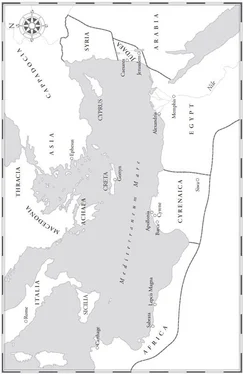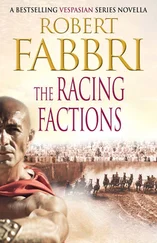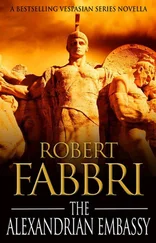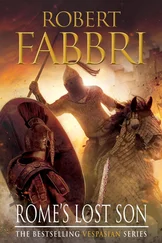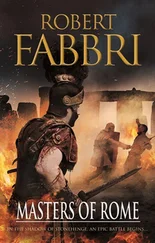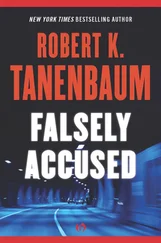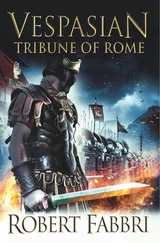Robert Fabbri - False God of Rome
Здесь есть возможность читать онлайн «Robert Fabbri - False God of Rome» весь текст электронной книги совершенно бесплатно (целиком полную версию без сокращений). В некоторых случаях можно слушать аудио, скачать через торрент в формате fb2 и присутствует краткое содержание. Жанр: Исторические приключения, на английском языке. Описание произведения, (предисловие) а так же отзывы посетителей доступны на портале библиотеки ЛибКат.
- Название:False God of Rome
- Автор:
- Жанр:
- Год:неизвестен
- ISBN:нет данных
- Рейтинг книги:3 / 5. Голосов: 1
-
Избранное:Добавить в избранное
- Отзывы:
-
Ваша оценка:
- 60
- 1
- 2
- 3
- 4
- 5
False God of Rome: краткое содержание, описание и аннотация
Предлагаем к чтению аннотацию, описание, краткое содержание или предисловие (зависит от того, что написал сам автор книги «False God of Rome»). Если вы не нашли необходимую информацию о книге — напишите в комментариях, мы постараемся отыскать её.
False God of Rome — читать онлайн бесплатно полную книгу (весь текст) целиком
Ниже представлен текст книги, разбитый по страницам. Система сохранения места последней прочитанной страницы, позволяет с удобством читать онлайн бесплатно книгу «False God of Rome», без необходимости каждый раз заново искать на чём Вы остановились. Поставьте закладку, и сможете в любой момент перейти на страницу, на которой закончили чтение.
Интервал:
Закладка:
‘Then you shouldn’t go making promises that you can’t keep.’
‘He served my family loyally for many years; I owe it to him.’
‘Then don’t begrudge him your time.’
Vespasian grunted and turned to make his way back along the bustling quayside through the mass of dock-workers unloading the newly docked trading fleet. His senatorial toga acted as an intimidating display of his rank, ensuring that a path was cleared for him through the crowd, making the hundred-pace journey along the quay to his waiting, one-man litter an easy affair.
Magnus followed in his wake enjoying the deference shown to his young friend by the local populace. ‘I didn’t think quaestors were normally treated with this much respect in the provinces,’ he observed as one of the four litter-bearers unnecessarily helped Vespasian onto his seat.
‘It’s because the Governors always hate it here and rightly so, it’s like living in a baker’s oven but without the nice smell. They tend to spend all their time in the provincial capital, Gortyn over in Creta, and send their quaestors here to administer Cyrenaica in their name.’
Magnus chuckled. ‘Ah, that’ll always help people to respect you, the power of life and death.’
‘Not really, as a quaestor I don’t have Imperium, no power of my own. I have to have all my decisions ratified by the Governor, which takes forever,’ Vespasian said gloomily, ‘but I do have the power to procure horses,’ he added with a grin as a dusky young slave boy led a saddled horse up to Magnus.
Magnus took the animal gratefully and threw his bag over its rump before mounting. ‘How did you know that I’d be arriving today?’
‘I didn’t, I just hoped that you would be,’ Vespasian replied as his litter moved forward, passing a theatre looking out over the sea. ‘When the fleet was sighted this morning I decided to come down on the off-chance, as it’s probably the last one of the season to arrive from Rome. Anyway, it’s not as if I had anything else worthwhile to do.’
‘It’s as bad as that here, is it?’ Magnus raised a wry eyebrow as the slave boy began fanning Vespasian with a broad, woven palm-frond fan on a long stick.
‘It’s terrible: the indigenous Libu spend all their time robbing the wealthy Greek farmers; the Greeks amuse themselves by levelling false accusations of fraud or theft against the Jewish merchants; the Jews never stop protesting about sacrilegious statues or some perceived religious outrage involving a pig, and then the Roman merchants passing through do nothing but complain about being swindled by the Jews, Greeks and Libu, in that order. On top of that everyone lives in fear of slave-gathering raids by either the Garamantes from the south or the nomadic Marmaridae to the east, between here and Egypt. It’s a boiling pot of ethnic hatred and the only thing that they hate more than each other is us, but that doesn’t stop individuals throwing money at me to rule in their favour in court cases.’
‘And you take it, I hope?’
‘I didn’t at first but I do now. I remember being shocked when my uncle told me that he took bribes while he was Governor of Aquitania, but now I understand the system better and realise that it’s expected of me. And anyway, most of the wealthy locals are so unpleasant it’s a pleasure to take their money.’
‘Sounds much like Judaea judging by Sabinus’ descriptions of it,’ Magnus mused as they passed into a crowded agora surrounded by dilapidated ancient temples dedicated to the Greek gods and overlooked by civic buildings cut into the hill above.
‘It’s worse, believe me,’ Vespasian replied, recalling his conversations with his brother upon his return from the East, concerning the utter ungovernability of the Jews. They had overlapped for two days in Rome before he had sailed for Creta at the end of March. ‘There you only had to deal with the Jews; they could be kept in line by their priests and by offering them small concessions. But here if you were to offer a concession to one group, then every bastard would want one until you’d find your-self giving the whole province away and hauled up in front of the Senate, or worse, on your return to Rome. That’s why I give nothing away to any of them unless I’m well paid for it; that way the other factions can’t complain that I’ve showed any favouritism because they know that I was bribed. Surprisingly, that seems to make it all right for them.’
‘I’ll bet that you wish you were back in Thracia,’ Magnus said, admiring the exertions of the slave boy who was managing to keep a constant flow of air moving around his master and maintain his footing despite the bad state of repair of the paving stones; the city had seen better days.
‘At least we had some decent troops to threaten the locals with. Here all we’ve got is one cohort of local auxiliary infantry, made up of men who are too stupid to earn their living by thieving; then there’s the city militia, which comprises men too stupid to be an auxiliary; and finally an ala of local auxiliary cavalry, who are meant to protect us from the nomads, which is a joke because most of them have camels.’
‘What’s a camel?’
‘It’s like a big, brown goat with a long neck and a hump on its back; horses hate the smell of them.’
‘Oh, I saw some of them at the circus once; they made people laugh but they didn’t put up much of a fight.’
‘They don’t need to — according to the cavalry prefect, Corvinus, they can run all day across the desert; our cavalry hardly ever get near them.’
They passed through the city’s gates, guarded by marble lions to either side, and started the gentle eight-mile ascent to the city of Cyrene, set on the limestone plateau above. Vespasian sank back into a maudlin silence, contemplating the futility of his position in this part of the combined province of Creta and Cyrenaica. During the seven months he had been there he had achieved nothing, mainly because there was hardly any money to achieve anything with. For centuries the wealth of Cyrenaica had been in silphium, a bulbous-headed plant with a long stalk, whose resin was much prized as a rich seasoning and as a cure for throat maladies and fever; the meat from animals that grazed on it was also sold at a premium. It grew along the dry coastal plain — the Cyrenian plateau being more conducive to the cultivation of orchards and vegetables. However, in recent years the crop had mysteriously begun to fail to the point where it was no longer fed to livestock, thus killing off the meat industry; and over the last couple of years the quality of each crop had deteriorated no matter how intensively it was farmed.
Vespasian had tried to persuade the local farmers to produce other crops, but the thin nature of the soil and the paucity of rain on the plain, combined with the farmers’ fervent belief that if enough gods were sacrificed to on a regular basis the silphium would return to health, had thwarted him. Consequently the tax revenues were drying up as those with money hid it away and spent very little buying goods from those with even less. With very little money in circulation, grain, imported from the more fertile neighbouring provinces of Egypt and Africa, had reached sky-high prices as a consequence of greedy speculation by the merchants who controlled the trade. They had all denied it, when he had called them into his presence to explain themselves, and had put the blame squarely on the reduced amount of grain being received from Egypt in the past year; yet there had been no mention of a failure of the Egyptian harvest. The result was that the poor, whether Greek, Jewish or Libu, were always on the verge of starving and civil unrest was a constant threat.
Without sufficient troops to quash an uprising among the almost half a million population of Cyrenaica’s seven major cities, and without the authority to act in his own name, Vespasian had felt impotent and frustrated throughout his tenure of office. This feeling was now compounded by the Emperor Tiberius’ refusal to grant him an entry permit to the imperial province of Egypt, a province so rich that senators were allowed to visit it only with express permission from the Emperor himself; to do so without would be a capital offence.
Читать дальшеИнтервал:
Закладка:
Похожие книги на «False God of Rome»
Представляем Вашему вниманию похожие книги на «False God of Rome» списком для выбора. Мы отобрали схожую по названию и смыслу литературу в надежде предоставить читателям больше вариантов отыскать новые, интересные, ещё непрочитанные произведения.
Обсуждение, отзывы о книге «False God of Rome» и просто собственные мнения читателей. Оставьте ваши комментарии, напишите, что Вы думаете о произведении, его смысле или главных героях. Укажите что конкретно понравилось, а что нет, и почему Вы так считаете.
